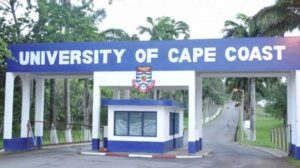UNIVERSITY OF CAPE COAST (UCC)

The University of Cape Coast was established in October, 1962 as a University College and placed in a special relationship with the University of Ghana, Legon. On October 1, 1971, the College attained the status of a full and independent University, with the authority to confer its own degrees, diplomas and certificates by an Act of Parliament – The University of Cape Coast Act, 1971 [Act 390] and subsequently the University of Cape Coast Law, 1992 [PNDC Law 278].
There is currently a draft Bill to amend the University of Cape Coast Law, 1992 (PNDCL 278) which repealed the University of Cape Coast, Act 1971 (Act 390), the University of Cape Coast (Amendment) Law, 1990 (P.D.C.L. 241) and the University of Cape Coast (Interim Administration Committee) Law, 1990 (P.N.D.C.L. 243) which established the University as an institution of higher learning.
It is expected that, when the Bill is subsequently passed into law, the original mandate of the University would be reviewed to make room for training of personnel in other disciplines to ensure that the focus of the University is widened.
Besides the need to give legal backings to current practices in the University as well as ensuring consistency with Constitution of Ghana, the passage of the Bill would also position the University to meet new challenges and demands of the Ghanaian Society and beyond and to keep pace with the developments in the higher education environment.
ORIGINAL MANDATE
The University was established out of a dire need for highly qualified and skilled manpower in education. Its original mandate was therefore to train graduate professional teachers for Ghana’s second cycle institutions and the Ministry of Education in order to meet the manpower needs of the country’s accelerated education programme at the time. Today, with the expansion of some of its Faculties/Schools and the diversification of programmes, the University has the capacity to meet the manpower needs of other ministries and industries in the country, besides that of the Ministry of Education.
STUDENT POPULATION
From an initial student enrolment of 155 in 1963, the University of Cape Coast now has a total student population of 74, 720 The breakdown is as follows: 18949 regular undergraduate students, 1445 sandwich undergraduate students, 1014 regular postgraduate students, 2773 sandwich postgraduate students 48989 distance undergraduate students and 1540 postgraduate distance students. The University admitted a total of 24723 students into its various programmes for the 2016/2017 academic year.
PIONEERING DEPARTMENTS
The University started with two departments, namely: Arts and Science. These departments developed into Faculties in 1963. In order to achieve the set objectives, in 1964, the University created two more Faculties, namely: Education and Economics & Social Studies [now Faculty of Social Sciences].
The fifth faculty [School of Agriculture] was established in 1975. The Faculty of Science was split into the Schools of Physical and Biological Sciences during the 2002/2003 academic year while the Department of Business Studies was also elevated to the School of Business with effect from the 2003/2004 academic year.
UCC CAMPUSES
OLD SITE
The Southern Campus or Old Site is uniquely situated in the heart of the hilly settlements of “Apewosika” and “Kokoado” in the Cape Coast metropolis close to the shores of the Atlantic Ocean, providing a daily comfortable sea breeze. The site sits on high ground above sea level providing a beautiful bird’s eye view of the ocean. The setting up of the University campus within these communities has opened them up to a lot of socio-economic activities.
The University’s Central Administration Block, the Adehye Hall only female hall of residence, the Atlantic Hall and the Oguaa Hall are located here.
Various useful university facilities providing service to the population beyond the university community are also situated on this side of campus. One of such facility is the University Hospital, which provides quality health care to members of the university community and the general public.
NEW SITE
The Northern Campus or New Site of the University of Cape Coast popularly referred to, as “Science” is located near Kwaprow and Amamoma communities, just about 1km away from the Old Site. The Northern Campus was established to meet the needs of the growing number of students admitted into to the university, as the University increasingly became the destination of choice for a lot of high school graduates from across the country and beyond. Being a recently developed campus, the new site is home to everything new you would find on campus; good roads, shopping centres, and modern structures, among others.
The University’s only male hall, Casley Hayford Hall, Kwame Nkrumah Hall, Valco all and the Campus Broadcasting Centre are all located here. The area is popularly referred to as “Science” because it is the location of the science building complex. Also located on the new site campus is the University garden, where flowers, ornamentals, shrubs and trees have been planted with a carefully designed plan that creates such a natural atmosphere for the leisure of both residents and visitors.
The University’s Zoo, which houses a wide variety of animals, is also located here, so is the University’s main library which is the biggest repository of documented knowledge that you would find anywhere on this side of the country.
Various structures of tourist value, including Castles, Forts and other relics of Ghana’s colonial masters are located nearby, providing a wide variety of options for entertainment and leisure. The campus is still being developed with new infrastructure springing up on yearly basis. Notable among such developments is the new central administration block which is almost complete.
Address: New Administration Block, Cape Coast
Closed ⋅ Opens 7:30AM Thu
Products and Services: ucc.edu.gh
Founded: October 1962
Total enrollment: 5,785 (2017)
Motto: Veritas Nobis Lumen (Truth, Our Guide., Latin)
Undergraduate tuition and fees: Domestic tuition 2,793 GHS, International tuition 5,647 USD (2011 – 12)
Colors: White, Vermilion, Aureolin




